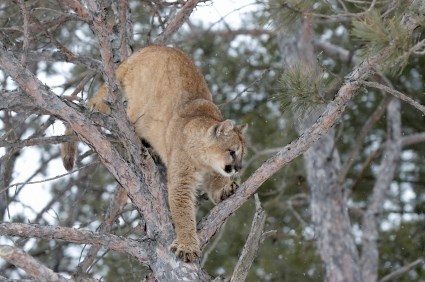Contributed/B.C. Conservation Officer Service

Image Credit: SOURCE/istockphoto.com
July 23, 2015 - 1:31 PM
Merely seeing a cougar does not mean you are in imminent danger. Watch the cougar’s behavior and respond accordingly.
STOP - Pick up all small children immediately. Do Not Run. Sudden movement may provoke an attack. Try to back away from the cougar slowly. SPACE and DISTANCE. Never approach a cougar at any time for any reason especially if it is near a kill or with kittens. Cougars will normally avoid a confrontation. Always give a cougar an avenue of escape. Prepare to use your bear spray.
STAY CALM - Talk to the cougar in a confident voice. Maintain eye contact with the cougar. DO Not Turn Your Back on the cougar. Face the cougar and remain upright.
APPEAR LARGE - Make yourself look larger than the cougar. Do Not Bend Over or Crouch Down. Raise your hands hold your coat open. Move to higher ground if nearby. Throw sticks, rocks, branches or other objects if within reach.
BE PREPARED - Bear spray, noise makers and walking sticks can be used for protection in the event of an encounter. Cougars can be attracted to dogs. So it is best to have your dog at home. If you do travel with a dog keep it close and on a leash at all times. Carry a cell phone to call for help in the event of trouble.
If a Cougar Behaves Aggressively
If a cougar shows interest or follows you, respond aggressively. Maintain eye contact, show your teeth and make loud noises. Arm yourself with rocks or sticks as weapons. When picking up objects crouch down as little as possible. Prepare to use your bear spray.
If a cougar attacks FIGHT BACK - Convince the cougar you are a threat and not prey. Many people have survived cougar attacks by fighting back by using anything, including rocks, sticks, bare fists and fishing poles. Focus your attack on the cougar’s face and eyes. If you’re knocked down, get back up. NEVER PLAY DEAD with a cougar.
Cougar attacks on humans are extremely rare, if concerned copies of the Safety GuideTo Cougars are available from your local Conservation Officers or at www.env.gov.bc.ca.
ABOUT COUGARS
The BC Conservation Officer Service established in 1905, is the lead Provincial Government program for managing and responding to wildlife/human conflicts where there is a risk to public safety or property damage.
Conservation Officers respond to human-wildlife conflicts using lethal and nonlethal means as appropriate. Human-wildlife conflicts are assessed to determine the level of risk and action required. A 24/7 call center is utilized to receive and direct complaints and provide information dealing with human-wildlife conflict.
Adult male cougars can weigh 140 – 165 pounds. Females typically weigh 100 pounds. The average life span for a male is 8-10 years, 12 to 14 for females.
Cougars are normally nocturnal and typically prey on their available food source within the areas they live. This diet can include deer, bighorn sheep, moose, beaver, black bear cubs, other cougar, bobcat, coyote, grouse and rodents.
Domestic animals and pets similar in shape, size and smell to wild prey – cougar may attack. Cougar are intelligent animals and learn to hunt through positive experiences. Cougar that have learned to hunt pets and livestock near residences, can threaten the safety of other pets and livestock in the neighborhood.
Killing a depredating cougar is only a short-term solution to loss of pets or livestock. Conservation Officers recommend the following tips to the public to assist in preventing cougar attacks on pets and livestock:
- Cats and dogs are easy prey. Attempt to keep your pets indoors or secure them in a covered run, especially through the night.
- Cougars depend on surprise to catch their prey. Installing either motion or timer activated outdoor lighting around your home and animal enclosures may keep cougar away.
- Cougar need cover to surprise a prey animal, clear a brush free zone around a residence and a pet/livestock night kennel/paddock.
- Rural residences should avoid feeding deer or other prey species, which may attract cougars that might opportunistically attack domestic animals.
- Build livestock cougar proof enclosures.
Cougar attacks on humans are extremely rare, if concerned, copies of the SAFTEY GUIDE TO COUGARS are available from your local Conservation Officer or at www.env.gov.bc.ca.
The British Columbia Ministry of Environment estimates the cougar population within our province to be approximately 4,000 animals. Even though cougar are seldom seen, the public should be aware they are present and at rare times travel through rural residential areas.
The Conservation Officer Service reminds the public when sighting a cougar or experiencing cougar pet/livestock depredation the importance of immediately calling the Conservation Officer Service’s 24/7 call center Report All Poachers and Polluters (RAPP) toll free line at 1-877-952-7277, cellular dial #7277 or on line at www.rapp.bc.ca.
News from © iNFOnews, 2015